
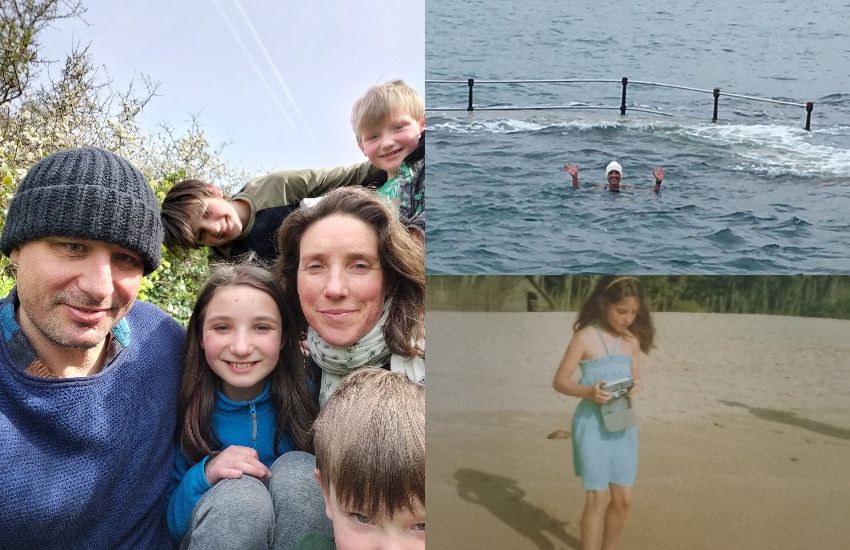

Eloquent, well-travelled and highly educated, Lindsay de Sausmarez is not someone who you imagine has firsthand experience of being homeless and living hand-to-mouth while holding down multiple jobs, but that is part of her story.
One of the first things I am keen to learn about a deputy in these interviews is their childhood. Lindsay was a wild card straight off the bat, having been born in Asia and then spending most of her childhood in far-off lands, with her summers in Guernsey. I also found common ground with her in having a father from Guernsey and mother from Scotland.
“I was fortunate enough to have a really interesting childhood. My dad left Guernsey shortly after leaving school and starting working in Asia,” said Lindsay.
“He met my mum on the boat out there and my two brothers and I were born in Asia. I had a real shock the first winter I spent in Guernsey because I spent my childhood only being here for summer."
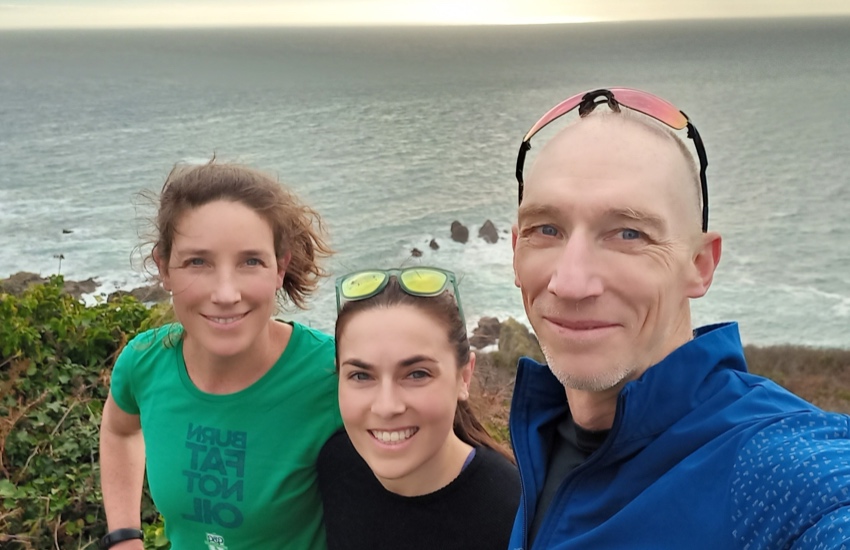
Pictured: Lindsay on a cliff run with her brother, a former professional IronMan, and his partner. Lindsay described their run as "an intense work out" for her and "a very easy day for them".
Lindsay continued: “My mum was very clever; the school terms in Asia were different to Guernsey so we used to come back early summer and I would be at school in Guernsey as well. I didn’t realise for years that other children got really long holidays.
“I loved it though because I really enjoyed school and it allowed me to have friends, as well as family, in Guernsey.”
Lindsay describes her education in Asia as being “a privilege”.
“The most interesting place I went to school was Sri Lanka, where I lived for about five years. It was such a melting pot of different cultures,” she said.
“Sri Lankan culture itself is very varied with different religions and cultural influences combined which I loved to learn about.
“I went to an international school and there was a policy of having a different student's country in the spotlight each fortnight, so I was continually learning about different cultures.”
Lindsay’s family lived in Sri Lanka during the height of a guerilla war, which Lindsay said her parents “carefully considered” before moving the family there.
“We often lived under curfew and had to go through police checks to get to school. Lessons and exams were easily disrupted by bomb scares,” she said.
“School was sometimes quite often interrupted by bomb scares, especially in exam periods, but missing lessons wasn’t nearly as fun as it sounds. We soon got bored of the interruptions.
“I remember one time we must have been evacuated maybe 10 days on the trot. We weren’t sent home, we had to sit in the middle of the sports pitch in baking hot weather without being able to get water or use the loo until the bomb squad had been through the whole building.
“The school was targeted once but fortunately not when any children were there.”
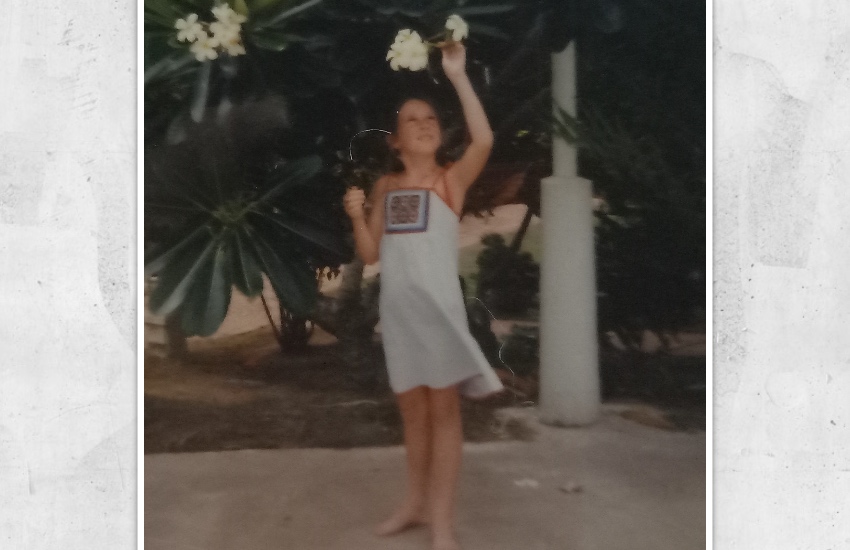
Pictured: Lindsay as a child in Sri Lanka where she lived for five years.
Lindsay explained that she was aware of what was happening in the country but had the “advantage of youth” in getting used to sights like armed police officers.
“Armed police were an everyday encounter, so when I saw one running through our garden and hiding behind a tree one morning, I didn’t give it a second thought, I carried on eating my breakfast,” she said.
“It wasn’t until I saw another one, and then another, that I realised what was odd about the situation; I wasn’t in Sri Lanka.
“We were back at home in Guernsey, where armed police weren’t in any way an everyday sight. Our house was semi-detached and an armed anti-terrorism team were surrounding the whole building.
“It turned out that an IRA suspect was hiding next door. It’s a bit ironic that, despite years of living in a conflict zone, it was in lovely peaceful Guernsey that I came closest to being caught in any crossfire."
Lindsay said that most of the conflict in Sri Lanka took place in other parts of the country from where she lived, but one instance stood out in her mind.
“I remember hearing a loud bang one afternoon, which I assumed was a huge clap of thunder,” she said.
“I had a conversation with my mum at the time that it was an odd day to hear thunder. It wasn’t until we saw the newspaper the next morning that we found out what we had heard was a bomb detonating about a mile away at a bus station in Pettah.
“More than 70 people were killed; it was incredibly sad. Luckily we hadn’t been at the station, but to be just a mile away has stuck in my memory.
“I was very aware second hand and through the impact it was having on other people, including our friends, quite how devastating the conflict was.
“It’s a beautiful country with beautiful people and I feel so lucky to have spent time growing up there. It’s really sad to see on the news again the struggles they are experiencing now."
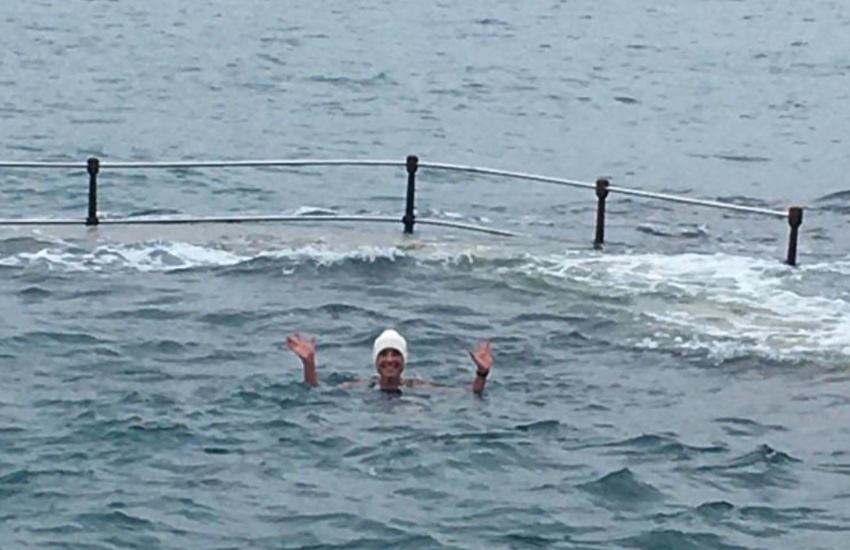
Pictured: Lindsay describes herself as a "water baby" who gets "twitchy" if she is too far from the sea. She is pictured swimming on her birthday in December last year.
Lindsay’s parents moved back to Guernsey when she was 16.
“When my parents moved back to Guernsey full-time, I was settled in school in Scotland, where my mum is from, and I decided to stay there to finish my education,” she said.
“Around the same time, I benefited from a right-place-right-time conversation, which helped me secure a week of work experience with Granada Film in London.
“One of my brothers was living in London at the time so I was able to stay on his sofa while I did the work experience placement.
“I was the most enthusiastic photocopier and coffee maker Granada had ever had. There was a huge amount of photocopying to be done; it was pre-digital so every time there was a script revision, sometimes several times a day, we would have to photocopy the amends in on different colour paper.
“I made myself so enormously useful in the pre-production stage of the film that I was invited on to the film set and that was the introduction into what would later become my career.”
Lindsay returned to work for Granada “at every opportunity” while she attended Durham University and attained a degree in English literature.
“Granada eventually paid me for my work and then offered me a permanent role in production,” she said.
“I would have loved to take that role, but I decided to move to Australia instead.”
When I asked what was drawing Lindsay to Australia, she said that it was about chasing an adventure.
“I had started going out with my then boyfriend, now husband, Rollo, in Guernsey and we both went to the same university,” she said.
“Rather strangely, our dads had known each other their whole lives and had grown up as friends. Our grandmothers were friends and our great-grandfathers had started a business together. But I didn’t meet Rollo through our family.
“Because we had been in two very close-knit, small communities together, I felt the need to expand my horizons after university and that’s what prompted me to move to Australia alone.”
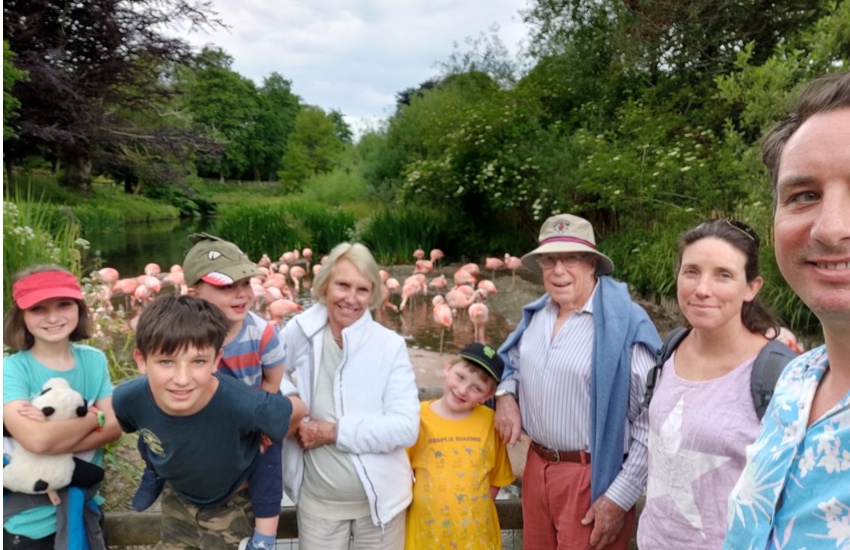
Pictured: Lindsay at Jersey Zoo with her parents, husband, Rollo, and children L-R: Zara 10, Tom, 12, Xavier, 3 and Theo, 8.
Lindsay described her move to Australia as an “exciting time”, with the country preparing to host the Olympics. She stayed there for five years, having a lifestyle that I was surprised to learn about.
“I found some work in film; I have always done jobs that I loved, but that were low paid. I would often have to supplement it with other work. I would often hold down two or three jobs at a time to make ends meet,” she said.
“Having low paid jobs and high rent was one of the most significant factors of my time in Australia. I experienced firsthand what it feels like to be properly skint and live hand to mouth.
“I remember the desperate hunger because you had to prioritise rent. At times I was living on nothing but apples and reduced-for-quick-sale bread.
“I also experienced being made homeless. I had a landlord who, with the benefit of hindsight, I think had some mental health challenges.
“He terminated my tenancy on the spot for no good reason and threw my belongings out the house. I found myself standing on the street holding everything I owned in a couple of bags.”
Lindsay stayed with friends for a couple of weeks while she got back on her feet.
“I’m very lucky I didn’t have children depending on me at that time. I didn’t know if I would have a roof over my head,” she said.
“I know the importance of security of tenure because I know what it’s like to not have that security.
“It was a very useful experience because it gave me a far better appreciation of what it’s like to slog your way through numerous low paid jobs and not have any security of a reliable roof over your head or know where your next meal is going to be coming from.”
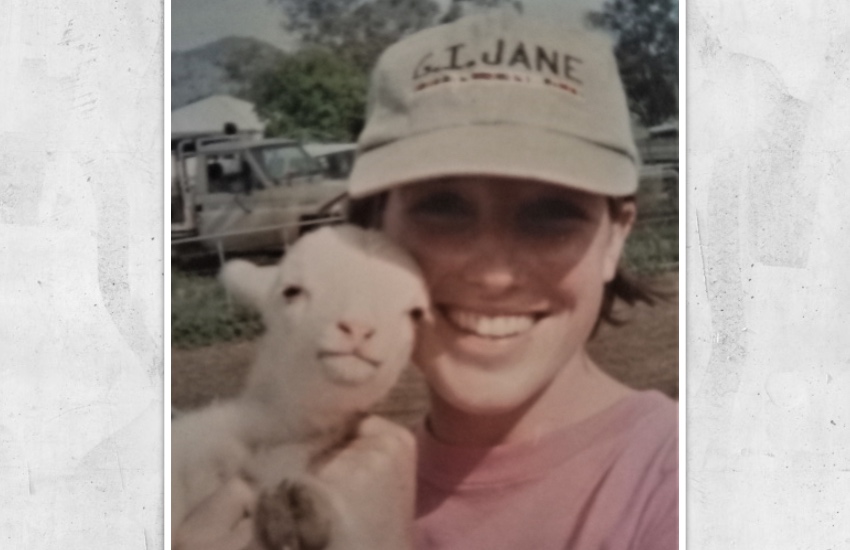
Pictured: While living in Australia in her early twenties, Lindsay spend time working as a "Jillaroo" (farmhand) on a farm three times the size of Guernsey.
Despite financial challenges, Lindsay said that her time in Australia helped her to “come out her shell”.
“I wasn’t massively introverted before I went to Australia, but as I didn't know anyone, I had a philosophy that I would never turn down an invitation. I made a promise to myself to stick to that,” she said.
“When I made that promise, I wasn’t banking on living with an absolute party animal for my first housemate. He would get back in the small hours of the morning, I’d have already been asleep for hours.
“He would wake me up and say we should go out and, because of the promise I made myself, I would go, and I always had a great time.
“I met some lovely people, had interesting jobs and it was a privilege to live in someone else’s culture and live in someone else’s country.”
It is common knowledge that Lindsay has a keen interest in environmental issues, and it doesn’t take much conversation with her to know that she is highly educated on the subject. She explained how her interest in the topic was sparked.
“I worked for a charity while in Australia, which was the first thing that really opened my eyes to some environmental issues. I had to do a lot of research into the extent and severity of the problem, even then,” she said.
“I was amazed that more wasn’t being done given what the science was telling us about climate change and environmental degradation and the poor use of finite resources.
“It really opened my eyes to a whole range of environmental issues that I’d never been that aware of before.”
Seemingly unsatisfied with her multiple jobs, charity work, freelance work as a writer (travel, environmental and health/lifestyle), Lindsay also undertook a master’s degree in theatre while in Australia.
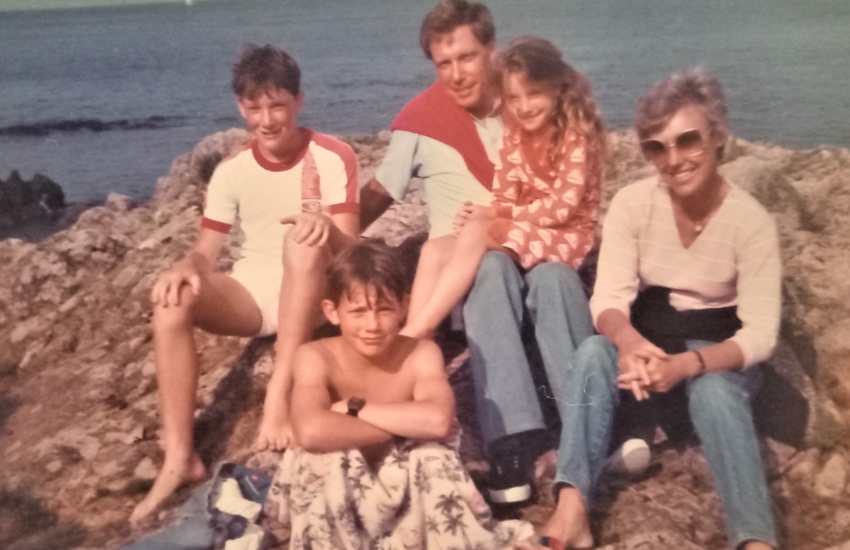
Pictured: Lindsay in Guernsey in the 1980s with her parents and brothers.
When deciding whether to stay in Australia, Lindsay recalled a number of “push and pull factors”.
“One of the push factors was that I was increasingly uncomfortable with some of the political context, around immigration in particular,” she said.
“I was an immigrant, but I was treated very well because I was English-speaking and white. I was very uncomfortable with Australia’s policy of offshoring, which also has a very significant environmental impact.”
I was impressed with Lindsay’s strength of character in admitting that she was concerned that staying in Australia would see her tolerate behaviour which did not align with her values.
“I was uncomfortable with the level of racism which, seemed to me, to be endemic in that society at that time. It may well have changed,” she said.
“I was worried that I might lose perspective and I didn’t want to think that using certain terms was ok just because I was getting used to them.”
Lindsay said that Rollo and her family were both “pull factors” drawing her back to Guernsey.
“The pull factors were that I had done what I wanted to do, I’d finished my masters and the pull factors brought me back,” she said.
“I was in daily contact with Rollo, in the days before Facetime and WhatsApp, you had to put your money where your mouth was back then, with international calls.
“I thought that the lifestyle in Australia would suit him, and he did visit, but he said it couldn’t beat Guernsey.
“I had made it back to Guernsey a few times while living in Australia and, each time I left, it became more and more difficult. I really started to feel quite how far away Australia was.
“I missed my family and Rollo and I also missed the tomatoes; you cannot get a decent tomato in Australia.”
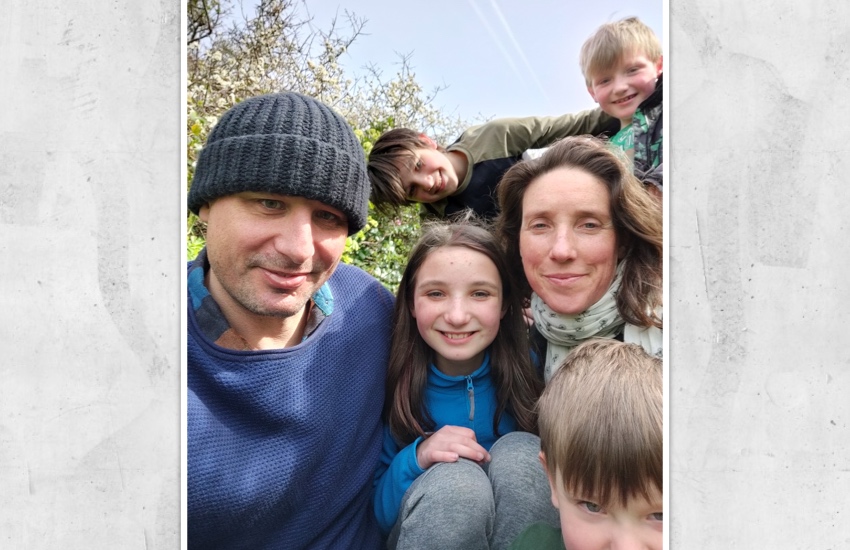
Pictured: The De Sausmarez family on a cliff walk. Lindsay said she is fortunate to live within walking distance of cliff paths.
Lindsay said she knew it was likely that she would settle down with Rollo and start a family.
“When I looked at it objectively, there is no better place than Guernsey,” she said.
“I am lucky that I have lived in a lot of different countries and had seen a lot of the world. I could have lived in any number of places because I didn’t have anything tying me down, but there wasn’t anywhere else in the world I wanted to be more than Guernsey.”
Lindsay was pleased to return to her family, although neither of her older brothers were living in the island.
“I lose track of which brother was living where at what stage. They were already living their grown-up lives by the time my parents moved back to Guernsey,” she said.
“One has lived in Canada so long that he is now officially Canadian. My other brother has moved around much more, and he is currently in Singapore.
“I wouldn’t say we’re great letter-writers, but I love seeing them. I love them to bits and get on with them very well.”
Lindsay recalled one of the “silver linings” of the pandemic was that the brother closest to her in age got “stuck” in Guernsey, unable to return home to Hong Kong with his family.
“They stayed with us for months and it was amazing. He has two children close in age to one of mine and they are best friends. It was incredible that they got to spend some time growing up together,” she said.
“My older brother is exhausting when he visits because he used to be an IronMan. Whenever he visits, I have to go on mammoth cliff runs to have time to chat with him because he doesn’t do ‘chilling’ very well.
“It’s a weird dynamic for siblings to all be so far apart, but we make the most of every second when we are together.”
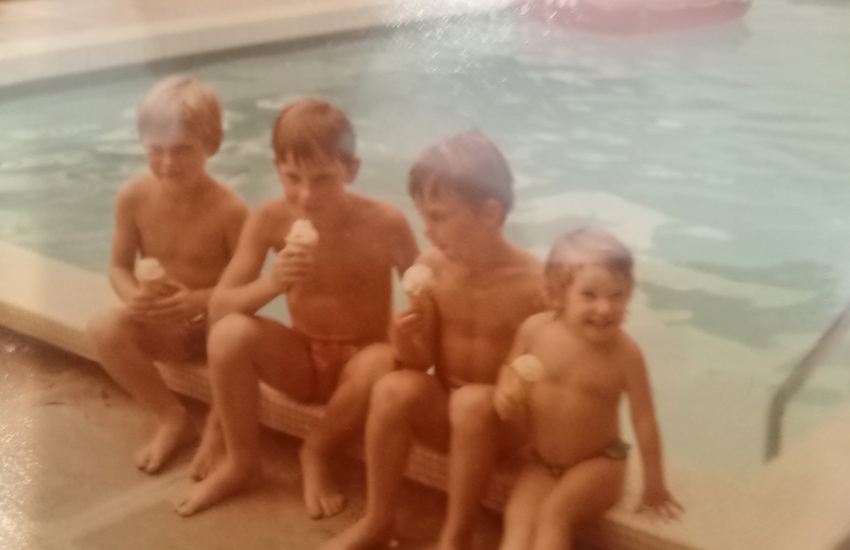
Pictured: Lindsay at a neighbour's pool with her brothers and a childhood friend when they lived in Borneo.
Lindsay said that one of her concerns about returning to Guernsey was that she wouldn’t be able to find employment in the field she enjoyed.
“I was working in TV, film and theatre so I definitely wondered what I would end up doing in Guernsey,” she said.
“Luckily I could fall back on writing, which has always been a string to my bow as an additional source of income, which I also loved doing.
“I was finding my feet with freelance writing, when I saw a vacancy for a job in the TV department at Specsavers. It was a match made in heaven; I stayed there for close to 15 years
"I wasn’t expecting to be able to work in media production so I couldn’t believe my luck when I was offered that role. I saw a lot of exciting change in the business and met some really special people who are still my best friends.”
I knew that Lindsay has four children and I asked how she balanced motherhood and a full-time career. Somewhat unsurprisingly, Lindsay’s first response was to ask whether I had asked the male deputies the same question.
After being satisfied that I had discussed the work/life/parenting balance with both Jon Le Tocq and Andy Taylor (the only male deputies to meet with me so far), Lindsay was happy to talk about the issue, which she had strong opinions about.
“Work has always been a really important part of not only my sense of self, but a really important part of my own mental health,” she said.
“I have always been a full-time working mum and I was fairly uncompromising in how I wanted to bring up children.
“I was very lucky to be able to breast feed them, use real nappies and cook everything from scratch. There was more to juggle because I wanted to bring them up in particular ways."
Lindsay largely credits the support of her family in allowing her to balance work and motherhood.
“I could never have anticipated just how lucky we are to bring our children up surrounded by their grandparents. They actually have an extra grandparent because Rollo’s parents are divorced and one of them has a partner so we have an additional grandmother who is wonderful,” she said.
“They have all played a really big role in our children’s upbringing. It does it a disservice to call it childcare because it's so much more than that. They’ve been magnificent."
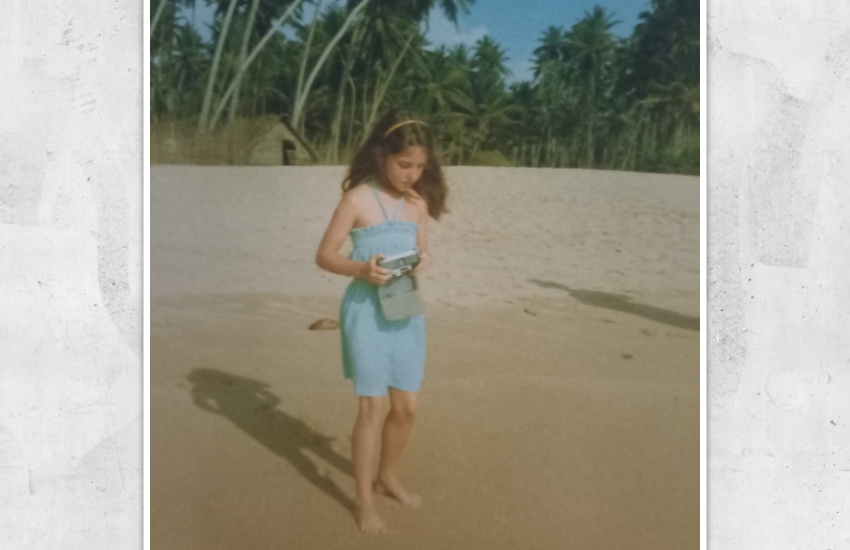
Pictured: Even as a child, Lindsay has always found an affinity with the sea.
Lindsay continued: “I hope they get something out of it too, but I am eternally grateful for their practical support and emotional support and all the enrichment they bring.
“It’s a different dynamic between grandchildren and grandparents. It always brings it home to me when I’m talking to friends in the UK and one will say she’s so lucky her mother-in-law is only an hour away, meanwhile I could hit my mother-in-law’s house with a stone, she lives so close."
Lindsay was quick to admit that Rollo was right that there is “no better place than Guernsey” and said that his input in family life was invaluable.
“My husband is really supportive and proactive. I’ve always felt it is important for my own wellbeing to work and we wouldn’t have been able to do it without the support of relatives. My husband is the main facilitator; he’s amazing,” she said.
“When we first started thinking about having children, Rollo promised he would do 50% of the parenting and he has always done at least that.
“He does so much of the laundry and most of the cooking. He has always been a proactive, engaged and involved dad and that has been the most enabling thing for me as a working mum.
"I have also always been fortunate enough to have work that I could arrange to some extent around the children, meaning I could spend time with them. It helps to have the kind of awesome manager and colleagues that I had at Specsavers who supported and enabled a more flexible approach."
Lindsay described herself as being “rabidly passionate” in her belief that “the frontline of feminism is men”.
“Rollo had to fight his own battles for inclusion of his parental needs in the workplace. He had to work hard to prove that flexible working would work for him. Typically, that was considered more of a woman’s thing,” she said.
“If men play a more active role in their children’s lives, then everyone gets the benefit. Rollo has always managed to play a big role in their lives.”
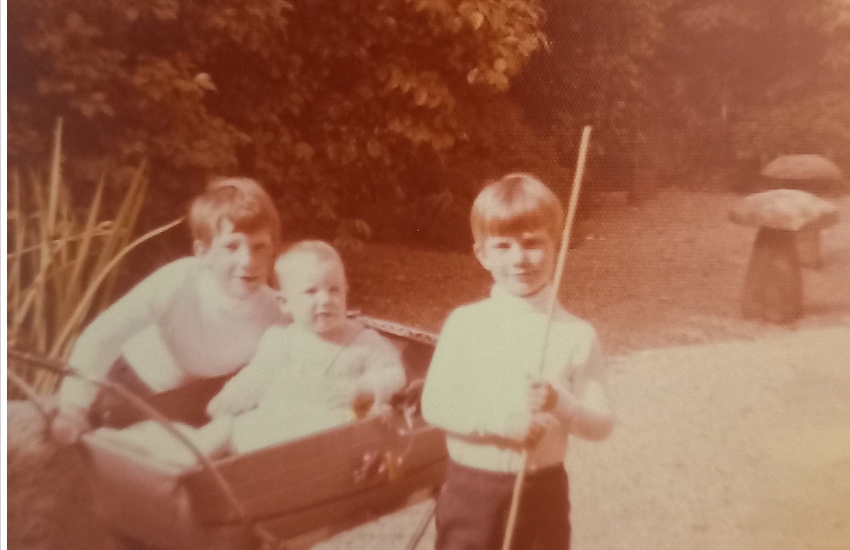
Pictured: Lindsay as a baby with her two older brothers, one of whom now lives in Canada and the other in Singapore.
In the interviews I have done for both “Poppy’s People” and “Poppy’s Politician’s”, I have found on every occasion that the individual has ended the interview acknowledging their family, be it parents, children or spouses.
It has not been lost on me that, without any planning or leading, the people I have interviewed have felt almost compelled to acknowledge the people who have had the biggest influences on their lives.
All of them have achieved remarkable things in their own right but, without exception, they never finish by talking about themselves. I had felt that Lindsay had thoroughly covered all members of her family. Family, however, is not limited by blood.
“When I was pregnant with my third child, a very close friend of mine, Claire Lee, died unexpectedly,” she said.
“It was a tumultuous time in my life to say the very least. I was pregnant with a child that I wasn’t entirely expecting, we needed to move to a bigger home, get a bigger car, he was born by emergency c-section and I had just lost someone who meant so much to me.
“Losing Claire affected many people. She was very well known and very well loved. She was Australian, as was her husband, and they were both well and truly embraced by the Guernsey community.
“Her husband, Barney, was left as a single parent to a three-year-old and eight-month-old; it was such an unbelievably sad situation.”
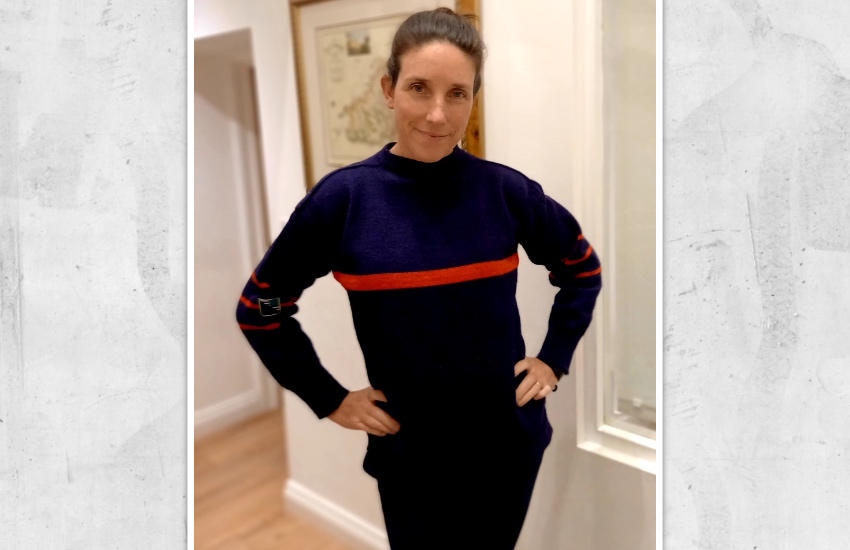
Pictured: Lindsay sporting an iconic Guernsey jumper.
Barney eventually moved to New Zealand, but Lindsay has stayed in touch with the family.
“Claire is buried in Guernsey so she will never leave. I’m not great at visiting graves, but I do try to go on the anniversaries,” said Lindsay.
Not knowing Claire, I asked Lindsay what she wanted people to know about her.
“She was very kind, very clever, very principled, very strong, great fun and a great friend to so many people,” she said.
“There were so many people who really loved her. They were, and still are, an incredibly special family. I don’t want her to be forgotten.”
Whether you are reading this having known Claire Lee or not, I can only tell you from Lindsay’s words and emotion that it would clearly have been a disservice for their friendship to go unmentioned.
I believe it to be true that we are remembered not by the things we have done, but by the mark we leave on others. In seeing the loss Lindsay expressed and the impact her friend clearly had on her, it would be safe to say that Claire Lee is worth remembering.
Comments
Comments on this story express the views of the commentator only, not Bailiwick Publishing. We are unable to guarantee the accuracy of any of those comments.